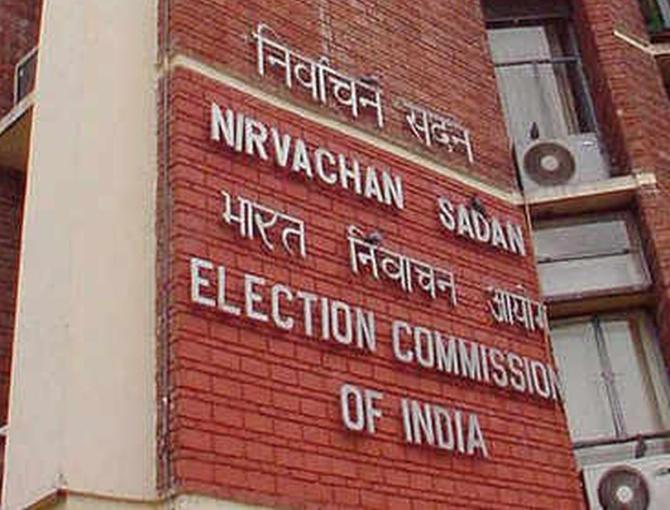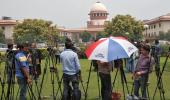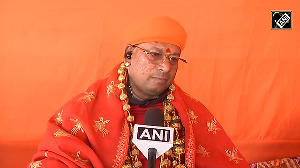In a far-reaching verdict, the Supreme Court on Thursday ruled that the appointment of the Chief Election Commissioner and the election commissioners will be done by the President on the recommendation of a committee, comprising the Prime Minister, Leader of the Opposition in the Lok Sabha and the CJI, to maintain the "purity" of the electoral process.

Observing that the means to gain power in a democracy must remain wholly pure and should abide by the Constitution, a five-judge constitution bench, headed by Justice KM Joseph, in its unanimous verdict said an "unrelenting abuse" of the electoral process over a period of time is the "surest way to the grave of the democracy".
Democracy is inextricably intertwined with power to the people and the "ballot, is more potent than the most powerful gun" and in a democracy, the "purity of election" must be maintained or else it would lead to "disastrous consequences", the apex court said.
Welcoming the ruling, opposition parties described the verdict as "historic" and said the judgment would pave the way for free and fair elections in the country. The Congress sought the same selection process for the appointments to the Enforcement Directorate.
The verdict has come at a crucial time, Congress spokesperson Abhishek Singhvi said, and alleged that the ruling party has been one of the "worst offenders" when it comes to the violation of electoral safeguards with no consequences for their actions while West Bengal Chief Minister and TMC chief Mamata Banerjee described the verdict a "victory of democracy".
The bench, also comprising Justices Ajay Rastogi, Aniruddha Bose, Hrishikesh Roy and CT Ravikumar, said the direction on the EC appointments will continue to hold good till a law on the issue is made by Parliament.
As of now, Chief Election Commissioner and ECs are appointed in terms of Article 324 of the Constitution by the President on the recommendation of the Centre.
The ECs, including the CEC, blessed with nearly infinite powers and are to abide by the fundamental rights, must "be chosen not by the executive exclusively" and particularly without any objective yardstick.
"With the accumulation of wealth and emergence of near monopolies or duopolies and the rise of certain sections in the media, the propensity for the electoral process to be afflicted with the vice of wholly unfair means being overlooked by those who are the guardians of the rights of the citizenry as declared by this court would spell disastrous consequences," the bench said.
The apex court said if the leader of the opposition in the Lok Sabha is not there, then the leader of the single largest opposition party will be in the committee to select the CEC and ECs.
The bench delivered its verdict on a batch of pleas seeking a collegium-like system for the appointment of election commissioners and the Chief Election Commissioner.
"We declare that as far as the appointment to the posts of CEC and the ECs are concerned, the same shall be done by the President of India on the basis of the advice tendered by a committee consisting of the PM, the LoP in the Lok Sabha and, in case, there is no such leader, the leader of the largest party in the Opposition in the Lok Sabha having the largest numerical strength, and the CJI," the bench said.
"As regards the relief relating to putting in place a permanent secretariat for the ECI and charging its expenditure to the consolidated fund of India is concerned, the court makes a fervent appeal that the Union of India/Parliament may consider bringing in the necessary changes so that the Election Commission of India becomes truly independent," the court added.
Justice Rastogi, who concurred with the 289-page lead judgment authored by Justice Joseph, delivered a separate verdict with his reasoning.
In the lead judgment, the top court said that a person, who is "weak-kneed before the powers that be", cannot be appointed as an election commissioner.
"A person, who is in a state of obligation or feels indebted to the one who appointed him, fails the nation and can have no place in the conduct of elections, forming the very foundation of the democracy. An independent person cannot be biased," it said.
"It is important that the appointment must not be overshadowed by even a perception that a ’yes man' will decide the fate of democracy and all that it promises," the bench said.
"Democracy can succeed only when all the stakeholders uncompromisingly work at it and the most important aspect of democracy is the very cautious electoral process, purity of which alone reflect the will of the people," it said.
The top court said undoubtedly, the commission is duty-bound to act fairly and legally and must abide by the provisions of the Constitution.
"The fate of the political parties and its candidates and therefore of democracy itself to a great measure is allowed to rest in the hands of the Election commission. While there may be officers who assist the commission, vitally important decisions have to be taken by those who are at the helm of affairs," it said.
"It is the CEC and the ECs at whose table the buck must stop," the bench said.
The bench observed that no law had been made for the appointment of the election commissioners, which was clearly in the contemplation of the founding fathers.
"Criminalisation of politics, a huge surge in the influence of money power, the role of certain sections of the media where they appear to have forgotten their invaluable role and have turned unashamedly partisan, call for the unavoidable and unpostponable filling up of the vacuum," it said.
It said the criminalisation of politics, with all its attendant evils, has become a "nightmarish reality" and the faith of the electorate in the very process, which underlies democracy itself, stands shaken.
"The impact of ’big money' and its power to influence elections, the influence of certain sections of media, makes it also absolutely imperative that the appointment of the Election Commission, which has been declared by this court to be the guardian of the citizenry and its fundamental rights, becomes a matter, which cannot be postponed further," it said.
Justice Rastogi, in his 89-page separate verdict, said it is desirable that the grounds for removal of the ECs shall be the same as that of the CEC, that is on the like grounds as a judge of the apex court subject to the "recommendation of the CEC" as provided under the second proviso to Article 324(5) of the Constitution of India.
"The conditions of service of the ECs shall not be varied to his disadvantage after appointment," Justice Rastogi said.
It referred to Article 324 of the Constitution which deals with the appointment of members of the Election Commission and said that Parliament has not passed any law in this regard as required by the Constitution.
Article 324 (2) says the Election Commission consisting of the Chief Election Commissioner and election commissioners, if any, as the President may from time to time fix and their appointments shall, subject to the provisions of any law made on that behalf by Parliament, be made by the President.
Describing the SC ruling as a "step in the right direction", the CPI-M in a statement said this will strengthen the independent authority and functioning of the EC.
The left party said it had always advocated that the selection process for the appointment in the EC should be on the lines of the CBI director and the Lokpal, among others, in a transparent and democratic manner.
TMC MP Derek O'Brien said the ruling will transform the "Extremely Compromised EC" to an "Extremely Competent EC".
AAP leader Sanjay Singh also said that the judgment will strengthen democracy.
"Now the PM, LoP and CJI will decide who will sit in the EC. The EC used to fix election dates by looking at PM's rallies, and announcements of schemes which called into question the impartiality of the EC. This decision will strengthen democracy," he said.
Shiv Sena (UBT) leader Priyanka Chaturvedi hailed the Supreme Court and called the judgment a "landmark" order.











 © 2025
© 2025